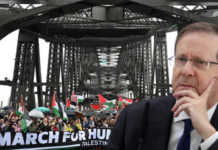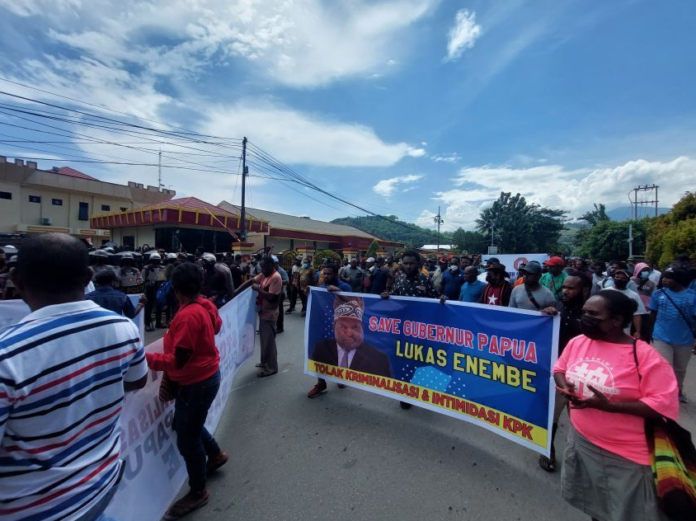
COMMENTARY: By Yamin Kogoya
Papuan protesters from seven customary regions this week stormed the Mako Brimob police headquarters in Kota Raja, Jayapura, accusing the KPK and police of “criminalising” local Governor Lukas Enembe.
The protest on Monday was organised in response to the Komisi Pemberantasan Korupsi (KPK) Corruption Eradication Commission’s attempt to investigate corruption allegations against Governor Lukas Enembe.
This time, Enembe is suspected of receiving gratification of Rp 1 miliar (NZ$112,000).
These accusations are not the first time that the KPK has attempted to criminalise Lukas Enembe, the Governor of Papua. The KPK has tried this before.
KPK had attempted to implicate the governor in their corruption scam in February 2017, but the attempt failed.
On 2 February 2018, KPK attempted another attack against Governor Enembe at the Borobudur Hotel, Jakarta, but [this] failed miserably. Instead, two KPK members were arrested by the Metro Jaya Regional Police. The KPK announced a suspect without checking with the governor first.
The representative of the Papuan people at the rally stated that KPK failed to follow the correct legal procedures in executing this investigation.
KPK should avoid inflaming the Papuan conflict, as the Papuan people have so far followed Jakarta’s controversial decisions — decisions that are contrary to the wishes of the Papuan people, a representative stated at the rally.
For instance, Jakarta’s insistence on the creation of new provinces from the existing two (Papua and West Papua) has been strongly rejected by most Papuans.
Remained silent
The spokespeople for the protesters warned KPK that they had remained silent because Governor Enembe was able to maintain a calm among the community. However, if the governor continues to be criminalised, Papuans from all seven customary regions will revolt.
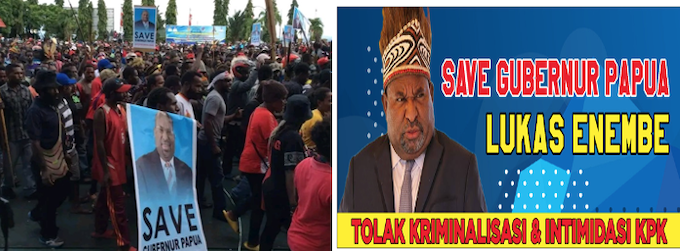
The KPK has named Governor Enembe as a suspect in the corruption of his personal funds.
“This is ‘funny’,” protesters said. “One billion rupiahs [NZ$112,000] of his own money used for medical treatment were alleged to be corrupt. This is strange. We will raise that amount, from the streets and give it to KPK.
“Remember that,” speakers said.
Stefanus Roy Renning, the coordinator of Governor Enembe’s Legal Council Team, said the case the governor was accused of (1 billion Rupiah) is actually, the governor’s personal funds sent to his account for medical treatment in May 2020.
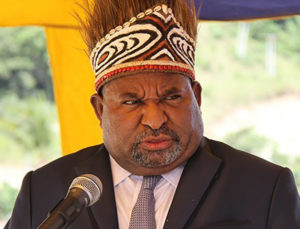
Therefore, if you refer to this [KPK’s behaviour] as criminalisation, then yes, it is criminalisation.
This is due to the fact that the suspect’s status was premature and not in line with the criminal code, and that the governor himself has not been questioned as a witness in the alleged case.
Questioned as witness
Renning said that for a suspect to be determined, there must be two pieces of evidence and he or she must be questioned as a witness.
Benyamin Gurik, chair of the Indonesian Youth National Committee (KNPI), expressed apprehension about the allegations, saying it amounted to the criminalisation of Papuan public figures, which may contribute to conflict and division in the region.
“Jakarta should reward him for all of the good things he’s done for the province and country, not criminalise him,” said Gurik.
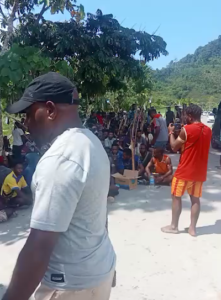
Otniel Deda, chair of the Tabi Indigenous group, urged the KPK to act more professionally.
He suspects that the KPK’s actions were sponsored by “certain parties” intent on shattering the reputation of the Papuan leader.
The governor himself has his own suspicions as to who is behind the corruption accusations against him.
He suspects KPK and the police force are among the highest institutions in the country being used to serve political games that are being played behind his back.
Purely a political move
According to Dr Sofyan Yoman, president of the Fellowship of West Papuan Baptist Churches (PGBWP), the attempted criminalisation of Governor Enembe is a purely political move geared toward dictating the 2024 election outcome, not a matter of law.
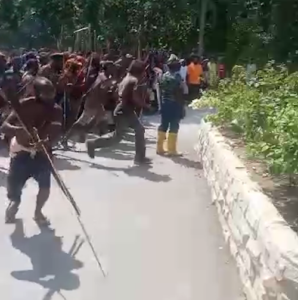
Dr Yoman explained that other parties in Indonesia are uncomfortable and lack confidence in entering the Papua provincial political process in 2024.
There have been those who have seen, observed, and felt that the existence of Lukas Enembe is a threat and an obstacle for other political parties seeking the position of number one in Papua.
To break the stronghold of Governor Enembe, who is also the chair of the Democratic Party of the Papuan province, there is no other way than to use KPK to criminalise him.
In a statement to Dr Yoman on Wednesday, Governor Enembe said:
Mr Yoman, the matter is now clear. This is not a legal issue, but a political one. The Indonesian State Intelligence, known as Badan Intelligence Negara (BIN), and the Indonesian Democratic Party of Struggle, known as Partai Demokrasi Indonesia Perjuangan (PDIP), used KPK to criminalise me.
Mr Yoman, you must write an article about the crime so that everyone is aware of it. State institutions are being used by political parties to promote their agenda.
Account blocked
Dr Yoman met the governor and his wife at Governor Enembe’s Koya residence, where he was informed of the following by Yulce W. Enembe:
In the last three months, our account has been blocked without any notification to us as the account owner. We have no idea why it was blocked. We could not move. We can’t do anything about it. Our family has been criminalised without showing any evidence of what we did wrong. Now we’re just living this way because our credit numbers are blocked.
The governor himself gave an account of how he used the Rp 1 billion:
As my health was getting worse, we left for Jakarta at night in March 2019. We were in lockdown due to COVID-19 at the time. When I left, I saved 1 billion in my room. In May 2019, I called Tono (the governor’s housekeeper). I asked Tono to go to my room and take the money in the room worth 1 billion. I asked Tono to transfer it to my BCA account. That’s my money, not corruption money.
“The KPK is just anybody,” the governor stated. “The KPK’s actions were purely political, not legal. KPK has become a medium for PDIP political parties. Considering that the Head of BIN, the Minister of Home Affairs, and the KPK descend from one institution — the police — these kinds of actions are not surprising to me.
“I am being politically criminalised”, said the governor. “Part of a pattern of psychological and physical threats and intimidation I have faced for some time”
“I am not a criminal or a thief,” the governor said.
Singapore health travel
The governor’s overseas travels for medical treatment in Singapore have been halted [barred] by the Directorate General of Immigration based on a prevention request from the KPK.
This appears to be a punitive measure taken by the country’s highest office to further punish the governor, preventing him from receiving regular medical care in Singapore.
Media outlets in Indonesia and Papua have been dominated by stories about the governor’s name linked to the word “corruption”, creating a space for hidden forces to assert their narratives to determine the fate of not only the governor, but West Papua, and Indonesia.
West Papua is a region in which whoever controls the information distributed to the rest of the world, controls the narrative. It is a region where the Indonesian government and the Papuan people have fought for years over the flawed manner in which West Papua was incorporated into Indonesia in the 1960s.
When news of a criminalised Papuan public figure such as Governor Enembe comes to the surface, it is often conveniently used as a means of demoralising popular Papuan leaders who are trusted and loved by their people.
It has been proven again and again over the past decade that Jakarta would have to deal with the revolt of hundreds of thousands of Papuans if they sought to disturb or displace Governor Enembe.
Ultimately, these kinds of nuanced incidents are often created and used to distract Papuans from focusing on the real issue. The issue of Papuan sovereignty is what matters most — the state of Papua, as Jakarta is forcing Papuans to surrender to Indonesian powers that seek to transform Papua and West Papua into Indonesia’s dream.
Papuan dream turned nightmare
Tragically, the Indonesian dream for West Papua have turned into nightmares for the people of Papua, recently claiming the lives of four Indigenous Papuans from the Mimika region, whose bodies were mutilated by Indonesian soldiers.
In recent weeks, this tragic story has been featured in international headlines, something that Jakarta wishes to keep out of the global spotlight.
The UN acting High Commissioner for Human Rights Nada Al-Nashif raised West Papua in her statement during the 51st session of the Human Rights Council on Monday — the day that Governor Enembe was summoned to police in Kota Raja.
Despite Jakarta’s attempts to spin news about West Papua as domestic Indonesian sovereignty issues, the West Papua story will persist as an unresolved international issue.
Governor Enembe (known as Chief Nataka) his family, and many Papuan figures like them have fallen victim to this protracted war between two sovereign states — Papua and Indonesia.
Some of the prominent figures in the past were not only caught in Jakarta’s traps but lost their lives too. In the period between 2020 and 2021, 16 Papuan leaders who served the Indonesian government are estimated to have died, ranging in their 40s through to their 60s.
Papuans have lost the following leaders in 2021 alone:
Klemen Tinal, Vice-Governor of Papua province under Governor Enembe, who died on May 21.
Pieter Kalakmabin, Vice-Regent of the Star Mountain regency, died on October 28.
Abock Busup, Regent of Yahukimo regency (age 44), was found dead in his hotel room in Jakarta on October 3.
Demianus Ijie, a member of Indonesia’s House of Representatives, died on July 23.
Alex Hesegem, who served as Vice-Governor of Papua from 2006-2011, died on June 20.
Demas P. Mandacan, a 45-year-old Regent from the Manokwari regency, died on April 20.
The Timika regency (home of the famous Freeport mine) lost a member of local Parliament Robby Omaleng, on April 22.
In 2020, Papuans lost the following prominent figures: Herman Hasaribab; Letnan Jendral, a high-ranking Indigenous Papuan serving in the Indonesian Armed Forces, who died on December 14; Arkelaus Asso, a member of Parliament from Papua, died on October 15; another young Regent from Boven Digoel regency, Benediktus Tambonop (age 44), died on January 13; Habel Melkias Suwae, who served twice as Regent of Jayapura, the capital of Papua, died on September 3; Paskalis Kocu, Regent of Maybrat, died on August 25; on February 10, Sendius Wonda, the head of the Biro of the secretary of the Papua provincial government, died; on September 9, Demas Tokoro, a member of the Papuan People’s Assembly for the protection of Papuan customary rights, died; and on November 15, Yairus Gwijangge, the brave and courageous Regent of the Nduga regency (the area where most locals were displaced by the ongoing war between the West National Liberation Army and Indonesian security forces), died in Jakarta.
These Indigenous Papuan leaders’ deaths cannot be determined, due to the fact that the institutions responsible for investigating these tragic deaths, such as the legal and justice systems and the police forces, are either perpetrators or accomplices in these tragedies themselves.
Dwindling survival for Papuans
This does not mean Jakarta is to blame for every single death, but its rule provides an overarching framework where the chances of Papuans surviving are dwindling.
This is a modern-day settler colonial project being undertaken under the watchful eye of international community and institutions like the UN. This type of colonisation is considered the worst of all types by scholars.
It is only their grieving families and the unknown forces behind their deaths that know what really happened to them.
The region for the past 60 years has been a crime scene, yet hardly any of these crimes have been investigated and/or prosecuted.
Given the threats, intimidation, and illness Governor Enembe has endured, it is indeed a miracle he has survived.
A big part of that miracle can be attributed to his people, the Papuans who put their lives on the line to protect him whenever Jakarta has tried to harass him.
This week, KPK tried to criminalise the governor and Papuans warned Jakarta – “don’t you try it”.
Yamin Kogoya is a West Papuan academic who has a Master of Applied Anthropology and Participatory Development from the Australian National University and who contributes to Asia Pacific Report. From the Lani tribe in the Papuan Highlands, he is currently living in Brisbane, Queensland, Australia.




























